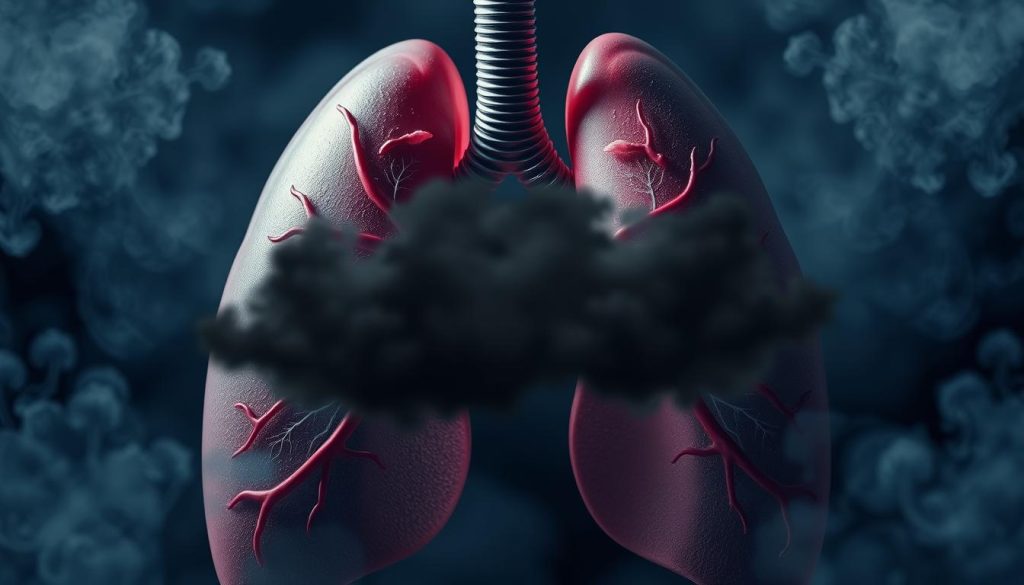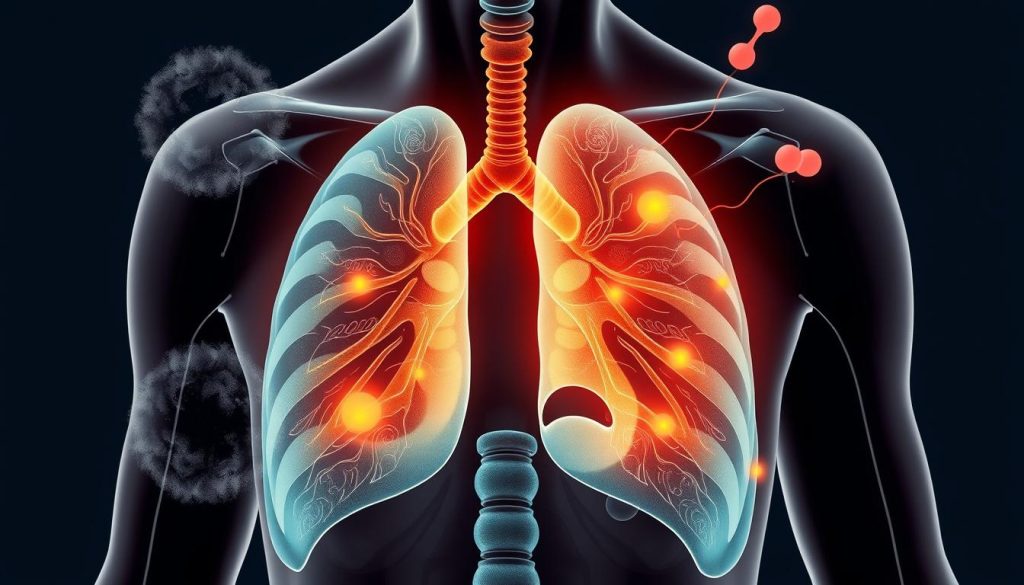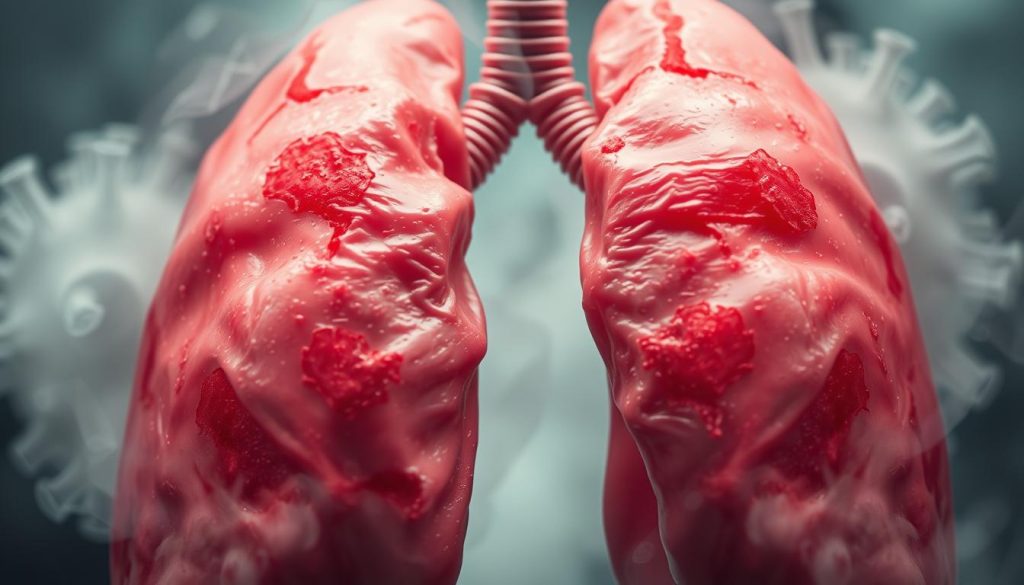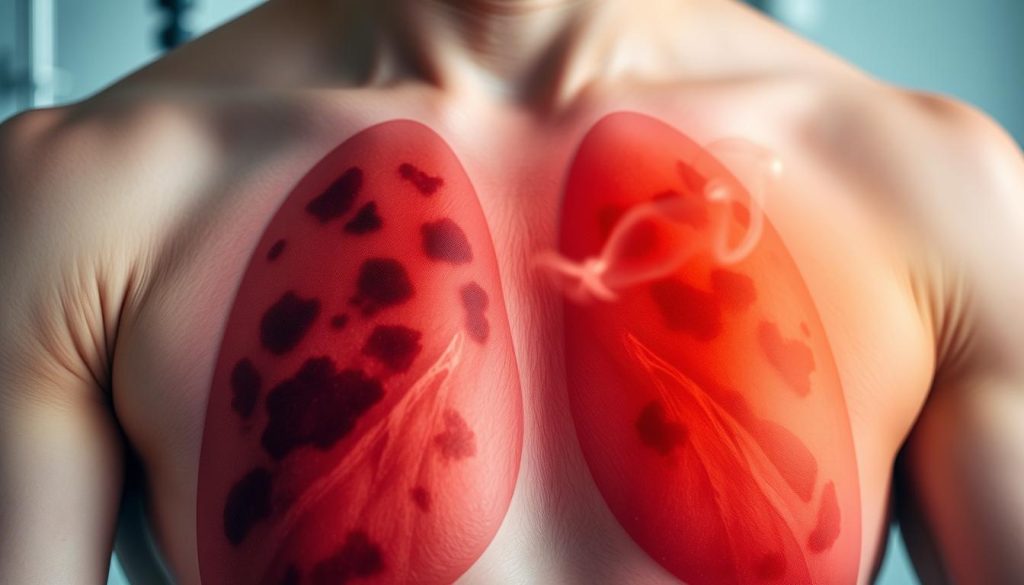Spotting lung cancer early can save lives. This disease often starts quietly, without clear signs. Knowing the early warning signs helps you protect your health. Lung cancer symptoms differ for everyone. A persistent cough, shortness of breath, or chest pain are red flags. Paying attention to these signs can lead to early detection and treatment.
We’ll dive into lung cancer symptoms in the next sections. This guide aims to educate and reassure you. Remember, many symptoms can have other causes. But, if you’re unsure, always talk to a doctor.
Understanding Symptoms of Lung Cancer: A Comprehensive Guide
Lung cancer symptoms can be subtle and easy to miss. This guide aims to boost health awareness by shedding light on the warning signs. Recognizing these symptoms early can lead to timely diagnosis and better treatment outcomes.
Lung cancer often develops silently, with symptoms appearing gradually. Some people might brush off early signs as everyday health issues. That’s why it’s important to pay attention to your body and note any persistent changes.
Common lung cancer symptoms include:
- A cough that doesn’t go away
- Coughing up blood
- Chest pain that worsens with deep breathing
- Unexplained weight loss
- Shortness of breath
- Recurring respiratory infections
Remember, having these symptoms doesn’t necessarily mean you have lung cancer. Many conditions can cause similar signs. But if you experience any of these symptoms for an extended period, it’s wise to consult a healthcare professional.
This guide will explore each symptom in detail, helping you understand when to seek medical attention. By staying informed, you take an active role in your health and well-being.
Persistent Cough and Changes in Breathing Patterns
Lung cancer often shows itself through small changes in how you breathe. Spotting these signs early can help doctors treat you sooner and better.

Chronic Cough That Won’t Go Away
If you’ve had a cough for over three weeks, it’s time to worry. This cough might be dry or wet, and it usually gets worse. If your cough doesn’t get better with usual treatments, see a doctor.
Changes in Existing Cough Pattern
If you smoke or have lung problems, a change in your cough is important. If your cough is more often, hurts, or sounds deeper, it could mean lung trouble.
Wheezing and Unusual Breathing Sounds
Wheezing or odd breathing sounds can mean lung cancer. These sounds happen when airways get blocked or narrow. If you hear new whistling, rattling, or bubbling, get help fast.
These symptoms don’t always mean cancer, but they need checking. Spotting these signs early can greatly improve your treatment chances.
Coughing Up Blood: When to Seek Medical Attention
Coughing up blood is a serious sign that needs quick medical help. It can be a small streak or a lot of bright red blood. It’s important to act fast if you see this.
Hemoptysis can happen for many reasons, like:
- Lung infections
- Chronic bronchitis
- Tuberculosis
- Lung cancer
- Blood clots in the lungs
If you cough up blood, even a little, get help right away. It could mean you have a serious problem that needs quick care.
When you see a doctor, tell them:
- The amount of blood you’re coughing up
- How long you’ve been experiencing this symptom
- Any other symptoms you’re having
- Your medical history, including smoking habits
Getting help early can make a big difference. If you cough up blood, call your doctor. Your health is very important.
Chronic Chest Pain and Discomfort
Chest pain is a common worry for many. It’s key to know the types and patterns of chest pain linked to lung cancer for early detection.

Types of Chest Pain Associated with Lung Cancer
Lung cancer can cause various chest pains. Some feel a dull ache, while others have sharp pains. These pains can get worse when you cough, laugh, or breathe deeply.
Distinguishing Cancer Pain from Other Conditions
Not all chest pain is from lung cancer. Heart issues, acid reflux, and muscle strains can also cause pain. Cancer pain usually doesn’t go away with rest or over-the-counter meds.
Pain Patterns and Location
The location and pattern of chest pain can hint at its cause. Lung cancer pain often happens on one side of the chest, matching the tumor’s spot. It may also spread to the shoulder, back, or arm on the same side.
| Pain Characteristic | Lung Cancer | Other Conditions |
|---|---|---|
| Duration | Persistent, lasting weeks | Often short-lived or episodic |
| Location | One-sided, may radiate | Can be central or widespread |
| Triggers | Breathing, coughing, laughing | Varies (e.g., exercise, eating) |
| Relief | Limited response to OTC meds | Often responds to treatment |
If you have ongoing chest pain or discomfort, see your doctor fast. This is true if you also cough or have breathing issues. Early lung cancer detection can greatly improve treatment results.
Unexplained Weight Loss and Appetite Changes
Sudden weight loss and changes in appetite can be signs of cancer. Many people with lung cancer lose weight even when they eat normally. This weight loss often happens before other symptoms show up.
Cancer cells use up energy and nutrients, causing weight loss. Some tumors release substances that affect appetite and metabolism. This can make people feel full quickly or lose interest in food, leading to more weight loss.
If you notice significant weight loss without trying, it’s important to pay attention. Losing 10 pounds or more over a few months is a reason to see a doctor. Keep track of your weight and eating habits to share with your healthcare provider.
| Warning Signs | Possible Causes | When to Seek Help |
|---|---|---|
| Rapid weight loss | Cancer-related metabolism changes | 10+ lbs lost in 3-6 months |
| Loss of appetite | Tumor effects on hunger signals | Persistent for 2+ weeks |
| Feeling full quickly | Tumor pressure on stomach | Ongoing for several meals |
Weight loss and appetite changes can have many causes. While they might signal lung cancer, only a doctor can find the real reason. If you’re experiencing these symptoms, make an appointment to talk about them.
Fatigue and Generalized Weakness
Feeling tired is normal, but cancer-related exhaustion is not. People with lung cancer often feel very tired and weak. This makes daily life hard.
Understanding Cancer-Related Fatigue
Cancer-related fatigue is more than just being tired. It’s a deep feeling of exhaustion that affects the body, mind, and spirit. This fatigue doesn’t get better with rest and can last a long time after treatment.

Impact on Daily Activities
The weakness and fatigue from lung cancer make everyday tasks tough. Simple things like getting dressed or cooking meals are hard. Many patients struggle to focus or enjoy social activities because they’re so tired.
Managing Energy Levels
Managing energy with cancer-related fatigue is key. Patients find it helpful to:
- Prioritize important tasks
- Take short breaks during the day
- Do light exercise when they can
- Eat a healthy diet
- Get support from loved ones
| Fatigue Management Strategy | Benefit |
|---|---|
| Scheduled rest periods | Helps save energy for important tasks |
| Light exercise | Boosts stamina and mood |
| Balanced nutrition | Gives energy and supports the immune system |
| Support system | Reduces stress and offers practical help |
Understanding and tackling cancer-related fatigue can greatly improve a patient’s life. It helps them cope with the challenges of lung cancer.
Voice Changes and Persistent Hoarseness
Lung cancer can change your voice in unexpected ways. Voice changes and persistent hoarseness are often overlooked symptoms. They deserve your attention. These signs might occur due to the tumor’s impact on nearby structures or nerves.
Hoarseness is a common symptom that can last for weeks. It may start subtly, with your voice sounding raspier or deeper than usual. If you notice ongoing changes in your voice quality, it’s important to seek medical evaluation promptly.
One key mechanism behind these vocal changes is laryngeal nerve compression. As lung tumors grow, they can press on the nerves that control your vocal cords, leading to voice alterations. This compression can cause:
- A breathy or weak voice
- Difficulty speaking loudly
- Vocal fatigue after short periods of talking
Not all voice changes indicate lung cancer. Many conditions can cause similar symptoms. But if hoarseness persists for more than two weeks, and you have risk factors for lung cancer, consult your doctor for a thorough evaluation.
Shortness of Breath During Normal Activities
Shortness of breath, or dyspnea, can be an early sign of lung cancer. It starts subtly, making daily activities harder. As the disease gets worse, breathing problems get more severe, affecting your quality of life.

Early vs. Late Stage Breathing Difficulties
In early stages, you might only feel short of breath when you’re really active. You might get winded after climbing stairs or carrying groceries. But as the cancer gets worse, you can feel out of breath even when you’re just sitting.
This shows your lungs are not working as well as they should. It’s a sign you need to see a doctor right away.
Activity-Related Breathlessness
Even simple tasks can be hard because of shortness of breath. Activities that might make you feel short of breath include:
- Walking short distances
- Getting dressed
- Speaking for extended periods
- Bending over to tie shoes
If you’re always feeling short of breath, talk to your doctor. Catching it early can help manage symptoms and improve lung function. Remember, while shortness of breath doesn’t always mean lung cancer, it’s a symptom that shouldn’t be ignored.
Bone Pain and Spreading Symptoms
Lung cancer can spread to other parts of the body. This is called metastatic lung cancer. It often causes bone pain and other symptoms. Knowing these signs is key for early treatment.
Bone pain is a common sign of metastatic lung cancer. It starts as a dull ache that gets worse. The pain can be constant or come and go, affecting the spine, ribs, or hips.
If you have persistent bone pain, see a doctor right away. This is very important.
Other symptoms of lung cancer spreading include:
- Unexplained headaches
- Vision changes
- Seizures
- Yellowing of the skin (jaundice)
- Swelling in the lymph nodes
These symptoms might mean the cancer has spread to the brain, liver, or lymph nodes. It’s vital to spot early warning signs. If you notice anything unusual, get medical help fast.
| Symptom | Possible Metastasis Site | Action Required |
|---|---|---|
| Bone pain | Bones | Consult oncologist |
| Headaches, vision changes | Brain | Immediate medical evaluation |
| Jaundice | Liver | Urgent liver function tests |
| Swollen lymph nodes | Lymphatic system | Further imaging studies |
Early detection of metastatic lung cancer is very important. It can greatly improve treatment options and outcomes. If you have bone pain or other symptoms, get medical advice without delay.
Recurring Respiratory Infections
Recurring lung infections might signal lung cancer. People with lung cancer often get pneumonia or bronchitis often. These infections could mean a weak immune system or damaged lungs.

Frequency of Infections
Lung cancer patients might get sick more than usual. Getting a cold or bronchitis every few months is a red flag. If you’re sick often, see your doctor.
| Infection Type | Normal Frequency | Concerning Frequency |
|---|---|---|
| Common Cold | 1-3 times per year | Monthly or more |
| Bronchitis | Rarely | 2+ times per year |
| Pneumonia | Very rarely | Once a year or more |
Recovery Patterns
Notice how fast you recover from infections. Lung cancer can make recovery slower. If bronchitis lasts weeks or pneumonia takes months, it might be serious.
Recurring lung infections don’t always mean cancer. But, they shouldn’t be ignored. If you’re worried about frequent illnesses or slow recovery, get a check-up from your doctor.
Risk Factors and Early Detection Methods
Knowing about lung cancer risk factors is key to catching it early. Smoking is the main cause, but other things can raise your risk too. For example, radon gas, a radioactive element found naturally, can increase your risk. Family history and some genetic mutations also play a part.
Early detection is vital for better lung cancer outcomes. New screening methods have made a big difference. Low-dose CT scans are now the top choice for screening. They can spot small tumors early, which can save lives.
Regular health check-ups are a must, even more so for those at high risk. Your doctor might suggest screening based on your age, smoking history, and other factors. Catching lung cancer early through screening can lead to more effective treatments and better survival chances.
| Risk Factor | Screening Method | Recommended Frequency |
|---|---|---|
| Smoking history | Low-dose CT scan | Annually |
| Radon exposure | Home radon testing | Every 2 years |
| Family history | Genetic counseling | As advised by doctor |
By learning about lung cancer risk factors and using early detection methods, you can protect your health. Early diagnosis often means better treatment and a better quality of life.
When to Contact Your Healthcare Provider
Knowing when to see a doctor is key for lung cancer. If symptoms don’t go away or change suddenly, call your doctor. Early action can greatly improve treatment results.
Emergency Warning Signs
Some symptoms need quick doctor visits. Severe chest pain, coughing up a lot of blood, or trouble breathing are emergencies. Don’t delay – get help fast.
Scheduling Regular Check-ups
Regular doctor visits are important for your health. If you smoke or have a family history, talk to your doctor about screenings. These visits can spot lung issues early, before symptoms show.
Your health is your responsibility. If you’re worried, contact your doctor. They’re there to support you and ensure you get the care you need.
FAQ
Q: What are the most common early signs of lung cancer?
A: Early signs of lung cancer include a cough that won’t go away and coughing up blood. You might also feel chronic chest pain, unexplained weight loss, and shortness of breath. Remember, these symptoms can also mean other health issues. Always talk to a doctor to find out for sure.
Q: How does lung cancer affect breathing patterns?
A: Lung cancer can change how you breathe. You might cough more, wheeze, or hear unusual sounds. It can also make you breathe harder during activities. These changes happen as the tumor grows and blocks airways.
Q: Is coughing up blood always a sign of lung cancer?
A: Coughing up blood can mean lung cancer, but it’s not always the case. It’s a serious symptom that needs quick medical help. Other issues like bronchitis or pneumonia can also cause it. If you’re coughing up blood, see a doctor right away.
Q: How can I distinguish between chest pain caused by lung cancer and other conditions?
A: It’s hard to tell if chest pain is from lung cancer or something else. Pain from lung cancer often gets worse with deep breathing or coughing. It might also come with coughing or shortness of breath. But, chest pain can have many causes. Always see a doctor to get a correct diagnosis.
Q: Why does lung cancer cause unexplained weight loss?
A: Lung cancer can lead to unexplained weight loss for several reasons. The cancer cells can change how your body uses energy. It can also make you eat less. If you lose weight without trying and have other symptoms, see a doctor.
Q: How is cancer-related fatigue different from normal tiredness?
A: Fatigue from cancer is much worse and lasts longer than regular tiredness. It doesn’t get better with rest and can really affect your daily life. It can also make you weak and feel overwhelmed. If you’re tired all the time and have other symptoms, talk to your doctor.
Q: Can lung cancer cause voice changes?
A: Yes, lung cancer can make your voice hoarse. This happens when the tumor affects the nerve that controls your vocal cords. If you have hoarseness that lasts more than two weeks, you should see a doctor.
Q: At what stage does lung cancer typically cause shortness of breath?
A: Shortness of breath can happen at any stage of lung cancer. But, it’s more common in later stages as the tumor grows. Some people might feel breathless even in early stages, mainly during exercise. If your breathing changes, see a doctor.
Q: What types of bone pain might indicate the spread of lung cancer?
A: Bone pain from lung cancer that has spread is deep and lasts a long time. It can get worse at night or when you move. It often affects the back, hips, and ribs. But, bone pain can have many causes. Always check with a doctor to find out why.
Q: How often should high-risk individuals be screened for lung cancer?
A: How often you should get screened for lung cancer depends on your risk. People at high risk, like heavy smokers aged 50-80, should get annual low-dose CT scans. But, your specific needs might be different. Talk to your doctor about what’s best for you.
Q: What are the emergency warning signs that require immediate medical attention?
A: Emergency signs include severe chest pain, coughing up a lot of blood, sudden shortness of breath, and losing consciousness. If you have any of these, get help right away.


















